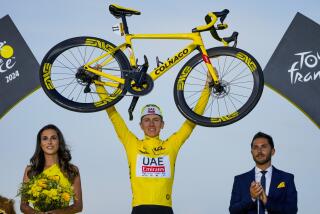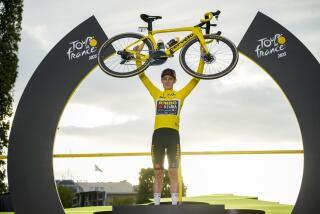Sixth Tour de France Title Puts Armstrong at Cycling’s Summit
- Share via
PARIS — Even as Lance Armstrong powered through the final eight days of the 20-stage Tour de France, the most famous and most grueling race in cycling, even as he dominated this last stretch of the 2,107-mile event by winning five stages, including three days in a row, Armstrong contemplated his future.
A 32-year-old cancer survivor from Austin, Texas, Armstrong won an unprecedented sixth consecutive Tour de France title Sunday.
No man in the 101-year history of the race had won as many, consecutively or not.
Tour director Jean-Marie Leblanc called Armstrong the Tour’s greatest champion.
“He’s the only one to have won it six times,” Leblanc said. “He won stages of all kinds, time trials, mountain stages. He’s an accomplished champion. Except for last year, he has never showed any signs of weakness.”
Armstrong has not said whether he would be back at the Tour next year. He has said he would race. It is the where that Armstrong won’t answer.
“This is the greatest bike race in the world, the one that matters most, the one I love the most,” Armstrong said. “But make no mistake about it: I’m still trying to enjoy life.
“I have three children in Texas and me in Europe -- three months in the winter, now three more months in preparation for the race. This is what will force me to change my schedule.”
Armstrong’s mark as a cyclist has been made almost solely by winning the Tour de France. Although Armstrong won a world championship in 1993 and an Olympic bronze medal in 2000, he hasn’t made a secret of his dedication to the Tour de France at the expense of cycling’s other prominent races. That may change.
Said Chris Carmichael, Armstrong’s longtime trainer, “There’s no question, Lance has a sense that there are other things out there.”
Bob Roll, a former racer and current TV commentator who used to go on training rides with Armstrong while he was recovering from cancer, added: “There are some empty places on his resume.”
The four men who had been tied with Armstrong with five Tour titles -- Frenchmen Jacques Anquetil and Bernard Hinault, Belgian Eddy Merckx and Spain’s Miguel Indurain -- all had other major titles to their names.
These races aren’t well known in the United States. But neither was the Tour until Greg LeMond brought it into the American consciousness when he became the first U.S. winner in 1986 and then won twice more, in 1989 and 1990. It was Armstrong’s fierce determination in overcoming testicular cancer, winning the Tour only three years after his illness was diagnosed, that helped to revive interest in the race only a year after a doping scandal nearly brought it to a halt in 1998.
Yet in Europe, where the sport has an eight-month season that runs from spring to fall, not simply a three-week extravaganza in July, there has been criticism of Armstrong for eschewing other major events.
The five-time Tour champions also had victories in comparable three-week races around Italy and Spain, the Giro d’Italia in the spring, and the Vuelta a Espana in the fall. Anquetil won the Giro once, Indurain won it twice, Hinault won it three times, and Merckx won it three times in a row and five times overall. Anquetil, Merckx and Hinault each won the Vuelta at least once, though Indurain never managed it.
There also is the lure of the one-hour record, in which men ride alone on a closed, circular course as far as they can for an hour. The race has been contested since 1907, and the record is held by British cyclist Chris Boardman, who rode 56.375 kilometers in 1996. Merckx and Indurain each held the record once.
“I’ve said I’d like to do the Giro before I stop, go for the world hour record,” Armstrong said. “But I’m almost 33.”
Merckx, who earned his nickname, The Cannibal, because of his insatiable hunger to win every stage and every race, is, arguably, the best cyclist ever. Five years ago, after Armstrong won his first Tour, a French cycling journal came up with a ranking system. Merckx was easily the top-rated cyclist of the 20th century.
In group media interviews during the first week of the 2004 Tour, Merckx, while complimentary of Armstrong, said: “I never did my career based on the Tour de France. The Tour de France was the most important race of the year, but it wasn’t the only one.”
But as Frankie Andreu, a TV commentator and former Armstrong teammate, said, it is more difficult for an American to race the entire cycling circuit when all the important contests are across the ocean.
Armstrong has juggled two lives this year after divorcing his wife, Kristin, and beginning a relationship with rock singer Sheryl Crow. Armstrong bought a house in Austin within a few blocks of Kristin and their three children -- son Luke and twin daughters Grace and Isabella.
While the children of many riders were sitting on their fathers’ shoulders or running alongside the bikes at the finish line Sunday, Armstrong was cheered by Crow; his mother, Linda; actor and friend Robin Williams; and several backers from his cancer foundation. But his children were in Austin.
“My son is almost 5. The girls are 3. They change so much in three months,” Armstrong said. “Maintaining a family life and a sporting life, I don’t know. [The children] are too important to me, and I become desperate at the end.”
Armstrong also has grown weary of questions about doping. Ever since he returned as a stronger, better, more focused rider after his cancer ordeal, Armstrong has faced skepticism that he could so dominate without resorting to illegal blood enhancements.
Though U.S. Postal Service team sporting director Johan Bruyneel has said Armstrong is the most-tested cyclist in the world, Armstrong faced questions not only from European media but also from LeMond, who had been Armstrong’s hero. LeMond was quoted in the French paper Le Monde in the second week of the Tour as wondering how long Armstrong could keep his alleged secret.
On the Velo News website Saturday, Andy Hampsten, the first American to win a stage at L’Alpe d’Huez, the most famous of the Tour’s mountain climbs, wrote a strong defense of LeMond, who had been criticized as being bitter about Armstrong’s fame.
Armstrong also has voiced frustration over several instances of fan booing.
“I don’t know what people want,” Armstrong said Saturday. “Do they want someone who doesn’t work hard, who doesn’t love the sport? If they do, then don’t cheer someone who was involved in the biggest doping scandal in this sport, and don’t boo me.”
Armstrong was referring to Frenchman Richard Virenque, the rider who won this year’s King of the Mountains jersey and who was a key figure in the Festina team doping scandal in 1998.
On Sunday, Armstrong enjoyed every moment of his trips up and down the Champs-Elysees. He drank champagne and joked with his U.S. Postal Service teammates.
On the podium, he smiled and his eyes glistened as the national anthem was played and everyone cheered.
President Bush called from his Texas ranch to congratulate Armstrong, calling him “awesome.”
Now Armstrong looks ahead convinced of only one thing. That he still wants to race.
More to Read
Sign up for Essential California
The most important California stories and recommendations in your inbox every morning.
You may occasionally receive promotional content from the Los Angeles Times.












